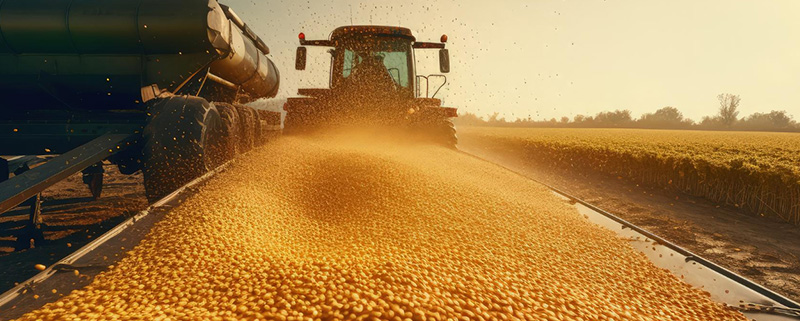
The Agribusiness Newsletter brings information and news about the main regulations and legal texts relating to the regulation of agribusiness in Brazil. This initiative seeks to cover the agribusiness industry on its transactional, litigation, tax and regulatory levels, and is an invitation for all of those working in this market to both access important news and comments on vital topics from the sector.
This material is for informative purposes only, and should not be used for decision-making. Specific legal advice can be provided by our legal team.
NEWS

CVM aims to take the global lead in green finance
Sustainable finance is expanding opportunities for Brazilian and foreign investors, as well as the business environment and the number of issuers, according to João Pedro Nascimento, president of the Brazilian Securities and Exchange Commission (“CVM”).
The concept includes the carbon market, green bonds, sustainable funds and sustainability standards.
On June 11 and 12, 2024, CVM participated in “Sustainability Week” in Manaus, discussing technological solutions for sustainability and the structuring of innovative financial products. In this context, the CVM is attentive to new global trends and sees sustainable finance as a great opportunity, especially for Brazil, a carbon bank.
Daniel Maeda, CVM’s director, believes that the CVM can lead the global debate on sustainable finance, aligning itself with the government’s Ecological Transition Plan. The CVM was a pioneer in recommending voluntary accession to the sustainable standards S1 and S2 of the International Sustainability Standards Board (“ISSB”).
The CVM’s green agenda includes reforms to increase transparency and expand comparative standards for investors. Superintendent Nathalie Vidual highlights the inclusion of Investment Funds in Agroindustrial Productive Chains (“FIAGRO”) in CVM Resolution No. 175 of December 23, 2022, connecting agribusiness to the carbon and capital markets. The CVM is also part of the federal government’s Sustainable Taxonomy Committee.
The CVM’s presence at Sustainability Week reinforces its goal of expanding the capital market in the northern region of Brazil. In 2022, the CVM held an event in Manaus and now returns with partners such as IDB Invest and the Brazilian Association of Financial and Capital Market Entities to continue this discussion.
For more information, access the Valor article here.
Agribusiness participation in capital markets grows 8% in one year
On June 05, 2024, the CVM launched the 6th edition of the CVM Agribusiness Newsletter, compiled by the Superintendence of Securitization and Agribusiness.
The new edition highlights the growing participation of agribusiness in the capital markets. The financial volume of the sector grew by 8% over the last 12 months, reaching BRL 492.91 billion.
The Agribusiness Receivables Certificate (“CRA”) market also grew by 7.7%, with net assets of BRL 140 billion in March 2024. In addition, the newsletter includes an interactive dashboard showing the evolution of the market and detailed data on FIAGRO and CRA, and will soon include information on agribusiness offerings.
For more information, access the CVM article here.
AGRO IN THE MEDIA

The AgriBiz article – Brazilian “retenciones”: At the stroke of a pen, the government caused shock and vocalization of Agribusiness sector against Provisional Measure
REGULATION

TAX REGULATION:
Executive branch submits second supplementary bill to regulate tax reform
On June 05, 2024, the Executive Branch submitted Supplementary Bill No. 108/2024 to the National Congress, seeking to regulate Constitutional Amendment No. 132/2023 (“EC”), which approved the tax reform on consumption.
This is the second bill submitted by the Executive Branch that is linked to the EC. As informed by the Federal Government, this bill aims to regulate the creation and structuring of the State Tax on Goods and Services (“IBS”) Steering Committee, IBS administrative litigation, the distribution of IBS collection proceeds, and provisions relating to the transition from the State Value-Added Sales Tax (“ICMS”) to IBS.
In addition, the supplementary bill provides for changes to the National Tax Code, providing details on the incidence of the Estate and Gift Tax (“ITCMD”), the Real Estate Transfer Tax (“ITBI”) and the Public Lighting Contribution (“COSIP”).
Among the main proposals we briefly highlight the following:
- IBS Steering Committee (“GC-IBS”) – Scope:
- collecting and distributing the IBS to the states, Federal District and municipalities;
- publishing IBS regulations;
- Inspecting, levying and collecting the IBS;
- standardizing common rules applicable to IBS and the Goods and Services Contribution (“CBS”); and
- controlling penalties relating to non-payment, undue crediting and ancillary obligations.
- Administrative Litigation:
- deadlines calculated in business days;
- proceedings carried out via an electronic system involving virtual trials;
- three trial levels; and
- defense mechanisms: objection, rectification request, request for unification of conflicting judgments based on case law, voluntary appeal and appeal for unification of conflicting judgments based on case law.
- ICMS Credits:
- Duly booked and approved ICMS credit balances not recorded by 2032 will be adjusted according to the IPCA inflation index and may be offset against ICMS debts, IBS debts, reimbursed in cash or transferred to third parties.
- ITCMD:
- The taxable event will be the transfer of any assets and rights that hold economic value, including corporate acts that result in disproportionate benefits to partners or shareholders, without any business justification, in transfers between related persons;
- The tax rate will be progressive according to the transaction value; and
- The ITCMD tax will be applicable even if the donors are domiciled abroad.
- ITBI:
- The taxable event will be triggered whenever the real estate is duly transferred through the execution of an instrument or deed, or when the right in rem over real estate is executed, in the case of inter vivos transfers and inter vivos
- COSIP:
- definition of COSIP’s purpose; and
- assignment of powers to charge COSIP to the Federal District and municipalities.
The text delivered to the House of Representatives will be analyzed by the appropriate committees and submitted to a plenary vote in two rounds. Approval of the bill requires an absolute majority of votes (257 out of 513).
The vote is expected to take place before the congress recess, which will begin on July 17, 2024. After approval, the bill will proceed to the Senate, which will vote in a single round and, finally, it will be submitted for presidential sanction or veto.
Market mobilizes to avoid tax on funds
Considering the discussions that are still taking place in connection with Supplementary Bill No. 68/2024, published on April 25, 2024 (“PL 68/24”), the market is questioning the proposal to classify investment funds as “suppliers” and “service providers”.
This change could lead to higher taxation and lower returns for shareholders, as funds would be subject to IBS and CBS. Currently, only fund administrators are taxed. Under the new classification, funds would also be taxed on their daily operations, including funds exempt from income tax.
Representatives of the Brazilian Association of Financial and Capital Market Entities (“ANBIMA”) are pushing for funds to be considered “unincorporated entities” and not service providers.
The market has held frequent discussions with the government and hopes for an adjustment to the bill, especially for real estate funds and FIAGROs.
For more information, access the Valor article here.
Brazil’s Federal Revenue Service allows the use of presumed PIS/COFINS credit on the purchase of untaxed diesel fuel
Through COSIT Answer to Inquiry No. 163/2024, the Brazilian Federal Revenue Service (“RFB”) authorized the use of presumed Social Integration Program Tax and Social Security Financing Tax (“PIS/COFINS”) credits on expenses incurred with the purchase of zero-tax diesel.
According to the RFB, although the non-cumulative tax laws prevent the use of credits arising from transactions not subject to the payment of these contributions, presumed PIS/COFINS credits relating to acquisitions of this nature could be used during a specific period (from March 11, 2022, to December 31, 2022, and January 01, 2023, to December 31, 2023), essentially under Supplementary Law No. 192/22 and Provisional Measure No. 1,157/23.
Taxpayers must be aware of the multiple opportunities for taking advantage of ordinary and presumed PIS/COFINS credits in the agricultural sector, assessing the risks involved.
CARF approves new precedents that can benefit agribusiness taxpayers
After a considerable period without publishing precedents, the Superior Chamber of Tax Appeals (“CSRF”) of the Federal Administrative Council of Tax Appeals (“CARF”) approved 14 new rulings formalizing positions that, to a certain extent, had been reiterated in administrative case law.
In addition to a number of other matters, the CSRF published three favorable rulings that can benefit taxpayers in the agribusiness sector:
- the first ruling, affirming the possibility of crediting PIS/COFINS on expenses incurred with freight contracting in the acquisition of inputs not burdened by these contributions (3rd Panel);
- the second, allowing the crediting of PIS/COFINS on the so-called “inputs of inputs” (a point that had already been formalized by the RFB in Normative Instruction 2,121/22) (3rd Panel); and
- the third, allowing the Rural Real Estate Tax (“ITR”) calculated on the basis of the Bare Land Value (“VTN”) to prevail over the arbitration made by the tax authorities on the basis of the Land Price System (“SIPT”), when the latter does not take into account the agricultural suitability of the property (2nd Panel).
ENVIRONMENTAL REGULATION
Environmental Licensing
State of Maranhão establishes procedures for obtaining Environmental Licensing Exemption
On May 29, 2024, the Secretariat for the Environment and Natural Resources of the State of Maranhão (“SEMA”) published SEMA Ordinance No. 254, which regulates the Environmental Licensing Exemption (“ILA”).
The ordinance specifies the activities exempt from environmental licensing, such as:
- agriculture – forage farming;
- aquaculture – fish farming of native species in suspended tanks, ranching;
- irrigation – sprinkler and localized irrigation systems; and
- livestock farming – poultry, pork and rabbit farming.
The ordinance determines the maximum final area of each establishment that carries out the activities listed as exempt from licensing.
In order to qualify for the exemption provided for in the ordinance, an activity must meet certain requirements:
- no intervention in a Permanent Preservation Area (“APP”);
- a Preventive Grant or Grant of Right to Use Water Resources or Waiver of Grant from the appropriate Environmental Agency, when applicable; and
- the final disposal of solid waste, the discharge of effluents and the generation of atmospheric emissions, noise and non-ionizing radiation must meet the standards established in current environmental legislation.
For more information, Access the article from the Official Gazette of the State of Maranhão.
State of Minas Gerais regulates sugar and ethanol industry
On June 11, 2024, the Government of the State of Minas Gerais published Law No. 24,806, which establishes rules on the installation of industrial establishments for the production of sugar and ethanol in the state of Minas Gerais.
The application to install these industrial establishments must be filed with the Minas Gerais Institute for Integrated Development (“InvestMinas”), including information such as:
- the project’s intended location;
- the planting area within the estimated scope, indicating the annual expansion from planting to maturity;
- the estimated production from the first year until maturity, including planted cane, cane to be crushed, production of alcohol, sugar, surplus energy and other related products;
- the implementation schedule detailing the agricultural phases and the evolution of the industrial unit;
- the project’s annual turnover; and
- the annual investment in the industrial and agricultural areas.
Once the viability of the project has been confirmed, the company can sign a memorandum of understanding with the state or indirect administration entities to establish reciprocal commitments relating to implementation.
Finally, schedules and commitments assumed by the business owner also apply to successor businesses and remain in place even in the event of changes to the company’s articles of organization, mergers, incorporations or spin-offs.
For more information, access Law No. 24,806 in full.
Forestry Matters
Federal Government provides for SICAR 2.0 – National Rural Environmental Registry System
On June 07, 2024, SGD/SETE/MGI Joint Ordinance No. 27 was published by the Secretariat of Digital Government (“SGD”), the Extraordinary Secretariat for State Transformation (“SETE”) and the Ministry of Management and Innovation in Public Services (“MGI”), regarding the Digital Transformation Project “SICAR 2.0 – National Rural Environmental Registry System”, aimed at mapping innovations to be implemented in the current National Rural Environmental Registry System.
In addition, the secretariats will have to assess the benefits and the extent to which the project is of public interest, as well as draw up a joint report on the implementation of activities, detailing the actions carried out and the targets achieved.
For more information, access SGD/SETE/MGI Joint Ordinance No. 27 here.
Federal government publishes regulation on the management of public forests for sustainable production
On June 06, 2024, Federal Decree No. 12,046 was published, which provides for the management of public forests for sustainable production.
The decree establishes rules for the National Registration of Public Forests, which is interconnected to the National Rural Registration System and will include:
- areas included in the Indigenous Land Registration;
- federal conservation units, except for private areas located in categories of units that do not require expropriation;
- forests located on urban or rural properties registered or being seized by the Federal Government, municipalities, foundations, public companies and mixed-capital companies;
- public forests in military areas with the authorization of the Ministry of Defense; and
- federal public forests planted after March 02, 2006 (not located in legal reserve areas or conservation units) registered upon consultation with the governing body.
In order to effectively regulate the management of public forests for sustainable production, the decree also provides for the allocation of public forests to local communities, the Federal Government’s Multi-Year Forest Grant Plan and federal forest bidding procedures.
For more information, access the decree in full.
Brazil launches program to protect mangroves
On June 06, 2024, the Federal Government published Decree No. 12,045, which creates the National Program for the Conservation and Sustainable Use of Brazil’s Mangroves (“ProManguezal”), which seeks to foster the conservation, recovery and sustainable use of mangroves, as well as to ensure the identity, quality, safety and innocuousness of products and by-products of plant origin in mangroves.
The program includes six implementation axes:
- conservation and recovery of mangroves and associated biodiversity;
- sustainable use of natural resources and improved production and marketing conditions;
- reduction of socio-environmental vulnerabilities associated with climate change;
- generation and dissemination of knowledge about mangroves;
- training and raising awareness about mangroves in Brazil; and
- financial strengthening and sustainability.
For more information, access the decree in full.
Brazilian government discusses integrated planning for fire prevention and control in Pantanal
On May 28 and 29, 2024, the Ministry of the Environment (“MMA”), as well as the states of Mato Grosso and Mato Grosso do Sul, held the Workshop for the Development of Integrated Planning to Prevent and Control Forest Fires in the Pantanal.
This initiative aims to reinforce cooperation between the federal government and the states to combat and prevent fires in the Pantanal biome.
During the workshop, data on hotspots in the Pantanal and a territorial and distribution analysis of fires and burnings in the Pantanal were presented, as well as the results of the workshops held in 2023.
Finally, the presidents of the Brazilian Institute for the Environment and Renewable Natural Resources (“IBAMA”), the Chico Mendes Institute for Biodiversity Conservation (“ICMBio”) and the Secretariats of the Environment and Fire Departments of Mato Grosso and Mato Grosso do Sul presented their operational plans for fire prevention and control.
For more information, access the MMA article.
State of Espírito Santo defines procedures for Legal Reserve Compensation
On June 03, 2024, the Espírito Santo State Institute for the Environment and Water Resources (“IEMA”) published IEMA Normative Instruction No. 07, which establishes the procedures for Legal Reserve Compensation, by means of donation, on properties located within public domain Conservation Units in the state of Espírito Santo.
According to the instruction, in order to compensate for the Legal Reserve by donating it to IEMA, the property must be previously registered with the Rural Environmental Registry (“CAR”), and be free and clear of any encumbrances or buildings owned by the property owner or third parties.
Property owners can also join as:
- assignors of the procedure, as long as the properties are located, totally or partially, within the internal boundaries of the Conservation Unit; and
- beneficiaries, owners or possessors of rural property who have a total or partial legal reserve debt on properties located outside the boundaries of the Conservation Unit.
For more information, access the normative instruction in full.
Companies responsible for illegal fires must restore deforested areas in the state of Amazonas
On June 06, 2024, the Amazonas State Government published Ordinary Law No. 6,920, which provides for reforestation by companies that cause illegal fires in the state of Amazonas.
The law establishes that companies that cause illegal fires will be responsible for reforesting the affected areas with native tree species, and will have up to three months after being convicted to start the reforestation project.
If the companies fail to comply with the reforestation obligation established by the law, they will be subject to the following sanctions, which will be based on the severity of the facts:
- warning;
- suspension of the company’s tax benefits, if any;
- a fine of up to BRL 10,000.00, and, in the event of a repeat offense, up to BRL 20,000.00.
The amount collected from environmental fines will be transferred to the Amazonas State Environmental Fund (“FEMA”).
For more information, access the ordinary law in full.
State of Maranhão introduces guidelines for recovering and preserving forests
On June 14, 2024, the State Government of Maranhão published Law No. 12.307, which creates the Living Forest Program in the State of Maranhão, linked to the State Secretariat for the Environment and Natural Resources.
This initiative aims to recover degraded areas and encourage the maintenance of forests in the state.
The program seeks to:
- encourage the maintenance of Maranhão’s forests and their ecosystem functions;
- develop sustainable production chains according to regional characteristics;
- develop the bioeconomy in the state of Maranhão; and
- implement the Action Plan for the Prevention and Control of Deforestation and Burning (“PPCDQ”).
The program will achieve these targets through the following axes:
- sustainable and inclusive development;
- state and federal fundraising, its own financial instruments and donations from private entities;
- incentives for rural credit aimed at preserving and maintaining the standing forest;
- improved efforts to prevent and combat illegal deforestation, burnings and forest fires;
- reforestation of degraded areas; and
- efforts to strengthen the bioeconomy in the state of Maranhão.
For more information, access the article from the Official Gazette of the state of Maranhão.
Plant products
State of Ceará publishes law on the inspection of plant products
On June 06, 2024, the State Government of Ceará published Law No. 18,839, which provides for the inspection and supervision of plant-based products in the state of Ceará and creates the State Inspection Service for Plant-Based Products (“SIEPOV”).
The SIEPOV, through the Ceará State Agricultural Defense Agency (“ADAGRI”), will be responsible for inspecting plant-based products in the state of Ceará. SIEVPOV aims to guarantee the identity, quality, safety and integrity of these products, recognizing their equivalence and accession to the Brazilian System for Inspection of Products of Vegetal Origin (“Sisbi-POV’).
According to the law, the state agricultural inspector will be in charge of inspecting plant-based products and by-products and applying administrative sanctions in the event of non-compliance with legal obligations.
The inspection of products will cover all activities relating to the production, circulation, transportation, storage and marketing of plant-based products in Ceará. This includes beverages, wine, grape by-products, plant products, by-products and residues of economic value.
For more information, access the law in full.
REGULATION – MINISTRY OF AGRICULTURE AND LIVESTOCK (“MAPA”)
Decree regulating mandatory inspection and monitoring of products intended for animal feed published
On May 28, 2024, Decree No. 12,031 was published, regulating the mandatory inspection and supervision of products intended for animal feed, in accordance with the guidelines established by Law No. 6,198 of 1974 and Law No. 14,515 of 2022.
The decree assigns MAPA the responsibility of carrying out these activities throughout the Brazilian territory.
The main provisions include the obligation to inspect and supervise products from production to marketing in places such as ports, airports, border crossings, industrial establishments, warehouses and rural properties. These provisions aim to guarantee the health and quality of food products intended for animals, as well as streamlining and simplifying the processes related to these activities.
MAPA amends procedures regarding the issuance of health certification for black peppercorns to the European Union
On June 12, 2024, MAPA, through the Secretariat of Agricultural Defense, reviewed and amended the procedures regarding the issuance of health certifications for the export of black peppercorns to the European Union.
The amendment adjusts the procedures to Law No. 14,515/2022 (the Self-Control Law) and takes into account risk analysis and the history of intercepting non-conformities and international notifications.
The new procedures will avoid delays and increase logistical agility. In addition, the new procedures will significantly reduce port operating costs, increasing the competitiveness of Brazilian products in the international market.
MAPA encourages the production and use of bioinputs in Brazilian agriculture
On May 28 and 29, MAPA organized the 3rd edition of the BioInova Space in the BioSummit 2024 event, to encourage the production and use of bioinputs in Brazil.
BioInova is an initiative of the Bioinput Innovation Network, created by MAPA’s Secretariat for Innovation, Sustainable Development, Irrigation and Cooperatives (‘SDI”). It aims to stimulate connections between the different players involved in order to foster opportunities for innovation around the production and sustainable use of biological inputs.
MAPA assesses the main damage and recovery measures in affected agricultural areas in Rio Grande do Sul
The technical team of MAPA’s Itinerant Office held meetings in the municipalities of the Serra Gaúcha Metropolitan Region that were affected by the heavy rains and floods that struck the state of Rio Grande do Sul.
The itinerant office is part of the Emergency Program for Reconstruction of Agriculture in Rio Grande do Sul (“PERSul”).
This initiative seeks to repair the damage and reinforce the resilience of Rio Grande do Sul’s agribusiness, demonstrating the federal government’s commitment to supporting the affected rural areas, as well as ensuring the continuity of agricultural activities in the state.
Court ruling orders MAPA to analyze the possibility of pharmacies manipulating veterinary product formulas
On May 09, 2024, the 2nd Federal Court of the Adjunct Federal Special Court of the city of Montes Claros (state of Minas Gerais), ordered MAPA to verify, within a maximum of 30 days, under penalty of a daily fine, the administrative request submitted by a pharmacy to release the manipulation of a veterinary formula.
The decision was based on MAPA’s excessive delay in evaluating the request, which exceeded the reasonable and expected timeframe. In his ruling, the judge in charge considered that the administration was in default and should also state whether the request had already been tacitly approved considering the length of time that had elapsed since it was filed.
The case in question refers to a writ of mandamus pending before the Minas Gerais Court of Justice (TJMG – Case No. 6004491-27.2024.4.06.3807).
MAPA publishes exceptional measures to support the dairy sector in Rio Grande do Sul
On May 08, 2024, Ordinance No. 1,108/24 was published, establishing temporary authorization for the adoption of exceptional measures by dairy establishments registered with the Federal Inspection Service (“SIF”), located in municipalities in the state of Rio Grande do Sul, due to the recognition of a state of public calamity.
The regulation seeks to mitigate the economic impacts faced by the dairy sector, ensuring that supplies are available to the population and avoiding both shortages and price increases for dairy products. In addition, sanitary rules adapted to the crisis situation have been established, preserving the traceability and safety of these dairy products.
REAL ESTATE REGULATION
INCRA issues CCIR for the 2024 financial year
Since June 18, 2024, the Rural Property Registration Certificate (CCIR) for the 2024 financial year can be issued through the National Institute for Colonization and Agrarian Reform (“INCRA”) website portal.
The CCIR is a document issued by INCRA which proves that the rural property has been properly registered, providing information on the ownership, area, location, exploitation and land classification of the rural property. This data is declaratory and exclusively used for registration purposes, and therefore cannot be used to legitimize rights of ownership or possession.
Under Brazilian law, there is no provision for specific penalties to be applied to rural properties without a proper registration with INCRA. However, the legislation does provide that the lack of a CCIR prevents rural property owners from proceeding with division, rural leasing, mortgaging, sale or promise of sale, as well as from approving amicable or judicial sharing and obtaining loans and agricultural financing. Thus, issuing the CCIR for 2024 is an essential step if there is an intention of carrying out any of the operations described above.
Related Partners
Related Lawyers
Amanda Gabrielle Ferreira Cavalcante
Lucas Schiavon Maturano
Monique Guzzo


























